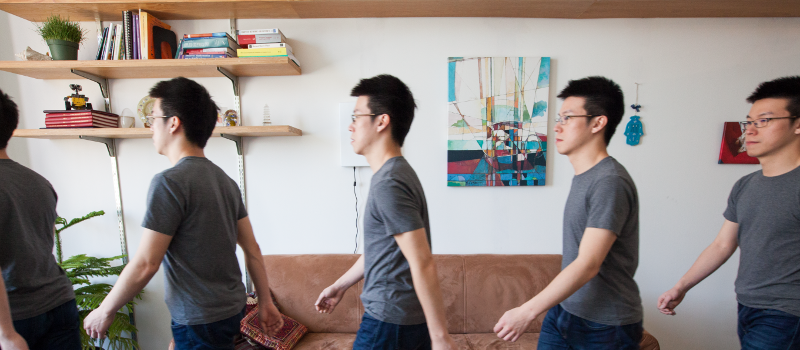There are a lot of ways to try to mathematically quantify how healthy a person is. Things like resting pulse rate, blood pressure, and blood oxygenation are all quite simple to measure and can be used to predict various clinical outcomes. However, one you may not have considered is gait velocity, or the speed at which a person walks. It turns out gait velocity is a viable way to predict the onset of a wide variety of conditions, such as congestive heart failure or chronic obtrusive pulmonary disease. It turns out, as people become sick, elderly or infirm, they tend to walk slower – just like the little riflemen in your favourite RTS when their healthbar’s way in the red. But how does one measure this? MIT’s CSAIL has stepped up, with a way to measure walking speed completely wirelessly.
You can read the paper here (PDF). The WiGate device sends out a low-power radio signal, and then measures the reflections to determine a person’s location over time. Alone, however, this is not enough – it’s important to measure the walking speed specifically, to avoid false positives being triggered by a person simply not moving while watching television, for example. Algorithms are used to separate walking activity from the data set, allowing the device to sit in the background, recording walking speed data with no user interaction required whatsoever.
This form of passive monitoring could have great applications in nursing homes, where staff often have a huge number of patients to monitor. It would allow the collection of clinically relevant data without the need for any human intervention; the device could simply alert staff when a patient’s walking pattern is indicative of a bigger problem.
We see some great health research here at Hackaday – like this open source ECG. Video after the break.
















Lewin Day, could you at least check if an article hasn´t been published before on HaD ?
ONLY FOUR DAYS AGO: Maloney published this same article: http://hackaday.com/2017/05/06/measuring-gait-speed-passively-to-diagnose-diseases/
You can now delete your article, thanks.
I was going to say, I’m having major de ja vu here…
Also I don’t know if Lewis is the one to blame here, as it maybe someone else who’s clicking the publish button, at the time.
Oh and it’s Lewin, not Lewis, whoops.
Your rant at Lewin is misplaced — it’s the editors’ responsibility to filter for dupes.
Perhaps you could have thought of a nicer way to notify us of the dupe, though, than turning it into a rude attack on a single author.
Wait, there are editors here? Why don’t they ever seem to, you know, edit? So many typos…
So you have the unedited copy to compare against, huh? Obviously you must since you know what changes were made.
Typos are irrelevant (this is a *blog*) and you’re a measly pedant if that’s what you’re concerned about. Spellcheck is the *tiniest* and least important part of the editing job.
ahah. so authors should not check if an article on the exact same hack has been published before (and when i mean before, it´s just than 100 hours delay) ?
Interesting point of view…
Race condition for the authors.
Likely both checked to see if there was already one written, there was not. Both complete an article.
Some editor screwed up and posted both.
Accidents happen, and this is an example of an oops to avoid.